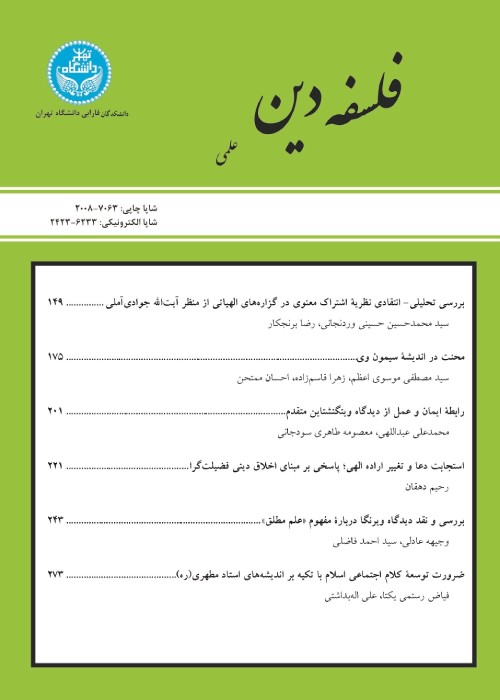Evaluating the Success of Intellect-Sufficiency Theory in Denying the Necessity of Prophethood
Author(s):
Article Type:
Research/Original Article (دارای رتبه معتبر)
Abstract:
Prophethood and divine revelation are among the most important pillars of divine religions and the key path to the delivery of the divine messages and wants to the human. In traditional theology, arguments have been put forth for the necessity of prophethood and divine revelation. However, in addition to the external anti-revelation arguments, some big opponents have raised over time against prophethood and revelation within the religious traditions to the point that this rejection of prophethood has come to be interpreted by some as “atheism.” The cornerstone of this movement is the consideration of the human wisdom as the highest source of perception. The adherent of this stance believe that the output of the prophets’ for the human is either congruent with intellect or is against it. If the former is the case, then revelation is a repetition of the intellectual findings of the human and so is absurd, and if the latter is true, then revelation is anti-intellectual and so is unacceptable. The authoritativeness of prophethood relies on answering this two-sided argument. The most important direction to adopt in answering this argument is that when we examine phenomena using intellect, in addition to intellect-verifiable and anti-intellect issues, there are intellect-evading phenomena as well. This is particularly true for the religious context and the focal topic of this article, i.e., the acceptance of the existence of God. Therefore, it can be maintained that the human has no way other than divine revelation to understand suchlike issues. Moreover, the inability of the human to perceive some details of religious rules and propositions through intellect, the confirmation of the intellectual judgment by the divine revelation, and the changes of intellect over time and in various locations – which lead to noticeable changes in the intellectual findings – are among the reasons for the authoritativeness of epistemic sources other than intellect in the domain of God’s legislative will.
Keywords:
Language:
Persian
Published:
Journal of Philosophy of Religion, Volume:18 Issue: 4, 2022
Pages:
541 to 563
magiran.com/p2403078
دانلود و مطالعه متن این مقاله با یکی از روشهای زیر امکان پذیر است:
اشتراک شخصی
با عضویت و پرداخت آنلاین حق اشتراک یکساله به مبلغ 1,390,000ريال میتوانید 70 عنوان مطلب دانلود کنید!
اشتراک سازمانی
به کتابخانه دانشگاه یا محل کار خود پیشنهاد کنید تا اشتراک سازمانی این پایگاه را برای دسترسی نامحدود همه کاربران به متن مطالب تهیه نمایند!
توجه!
- حق عضویت دریافتی صرف حمایت از نشریات عضو و نگهداری، تکمیل و توسعه مگیران میشود.
- پرداخت حق اشتراک و دانلود مقالات اجازه بازنشر آن در سایر رسانههای چاپی و دیجیتال را به کاربر نمیدهد.
In order to view content subscription is required
Personal subscription
Subscribe magiran.com for 70 € euros via PayPal and download 70 articles during a year.
Organization subscription
Please contact us to subscribe your university or library for unlimited access!


